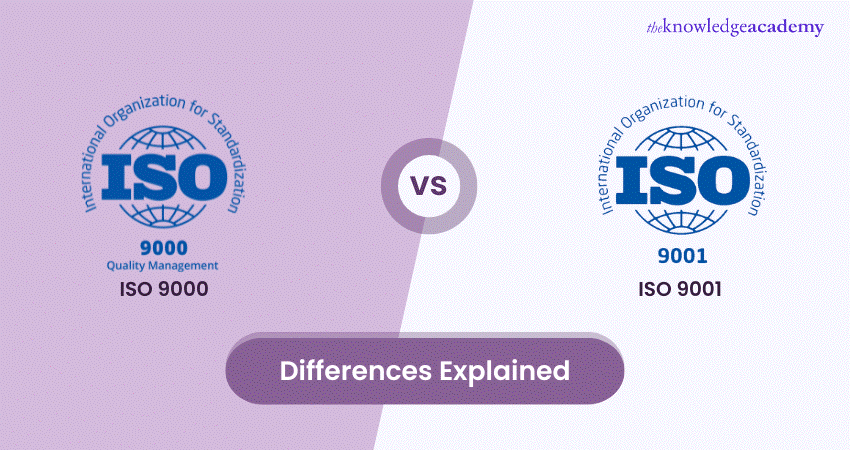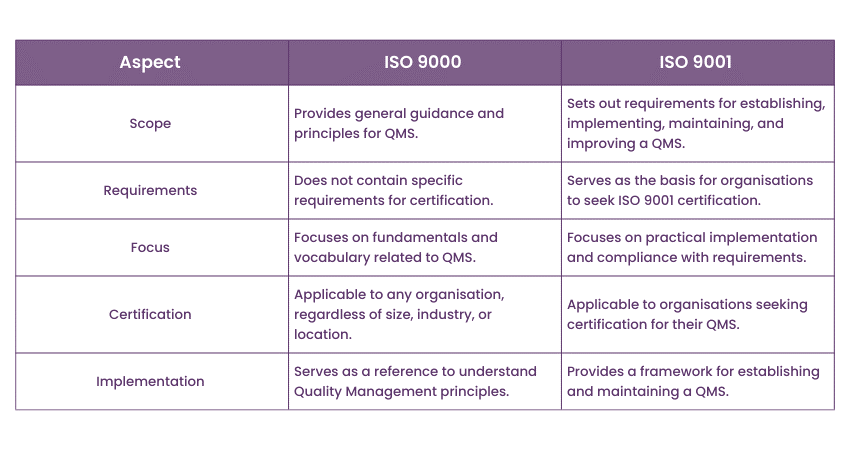We may not have the course you’re looking for. If you enquire or give us a call on +39 800580270 and speak to our training experts, we may still be able to help with your training requirements.
Training Outcomes Within Your Budget!
We ensure quality, budget-alignment, and timely delivery by our expert instructors.

Quality Management Systems (QMS) play a crucial role in enhancing the efficiency and effectiveness of an organisation. ISO 9000 and ISO 9001 are two of the most reputed internationally recognised standards that focus on Quality Management and are often adopted by the biggest organisations in the world. Their ever-growing popularity has meant that many people often enquire about a detailed comparison of ISO 9000 and ISO 9001. Read this blog for a detailed comparison between ISO 9000 vs 9001, and understand the benefits that ISO 9001 provides over its predecessor.
Table of Contents
1) An Introduction to ISO 9000 and ISO 9001
2) What is the differences between ISO 9000 and ISO 9001
a) Scope and Purpose
b) Certification
c) Specific Requirements
d) Auditing
e) Applicability
2) What benefits does ISO 9001 provide over ISO 9000?
3) Conclusion
An Introduction to ISO 9000 and ISO 9001
Before we delve deeper into the differences between ISO 9000 and ISO 9001, we will first discuss each of the standards.
What is ISO 9000?
ISO 9000 is not a certification or a specific standard; instead, it is a family of standards that provides guidelines to establish a robust Quality Management System. ISO 9000 serves as a foundation for understanding the ISO 9001 Principles and concepts of Quality Management. ISO 9000 standards consist of a well-defined set of guidelines that helps organisations worldwide implement the most effective quality management practices.
The ISO 9000 family includes three main standards: ISO 9000, ISO 9001, and ISO 9004. While ISO 9000 provides the terminology and fundamental concepts, ISO 9001 and 22000 establishes the requirements for an effective Quality Management System and ISO 9004 offers guidance on enhancing the total performance and sustainability of the QMS.
What is ISO 9001?
ISO 9001 is the most well-known and widely adopted standard within the ISO 9000 family. The standard specifies the exact requirements for a QMS that an organization must adhere to achieve ISO 9001 certification. This certification showcases an organisation's commitment to delivering consistent quality when it comes to its products or services, as well as meeting and bettering customer expectations.
Take the first step towards achieving excellence with our ISO 9001 Foundation course – sign up now!
What is the Difference between ISO 9000 and ISO 9001

While ISO 9000 provides the foundation and terminology for Quality Management Systems, its successor is the standard organisations can seek certification for. Here are the key differences for ISO 9000 vs ISO 9001:
Scope and purpose
ISO 9000 provides the foundation and framework for understanding Quality Management principles and terminology. On the other hand, ISO 9001 establishes the specific requirements for establishing a QMS and serves as the basis for the certification.
Certification
ISO 9000 is not a certification standard but a family of ISO Quality Standards. Compliance with ISO 9000 guidelines helps organisations prepare for ISO 9001 certification. ISO 9001 is the certification standard that organisations can achieve after meeting its requirements. On the other hand, ISO 9000 provides general guidance and principles applicable to any organisation; ISO 9001 is a specific standard with defined requirements that organisations must meet to obtain certification.
Specific requirements
ISO 9000 does not have any specific requirements that organisations must fulfil. However, ISO 9001 outlines specific requirements, including ISO 9001 Documentation, processes, and continual improvement, that organisations must meet to obtain certification. While ISO 9000 outlines the fundamental concepts and principles that organisations should understand, ISO 9001 sets out the requirements for establishing, implementing, maintaining, and improving a Quality Management System.
Gain a functional understanding of the QMS by joining our ISO 9001 Training Sign up now!
Auditing
ISO 9000 does not involve external audits for certification. In ISO 9001, however, external certification bodies conduct audits to assess an organisation's compliance with ISO 9001 Requirements. ISO 9000 focuses on providing general guidance and principles for Quality Management Systems but does not outline specific auditing processes or criteria. using the ISO 9001 Audit Checklist, to assess the effectiveness of their Quality Management System. to assess the effectiveness of their Quality Management System. Certification bodies also perform external audits to verify compliance with ISO 9001 requirements and determine eligibility for certification.
Applicability
The applicability of ISO 9000 is broad and extends to any organisation, regardless of its size, industry, or geographical location. The standard provides general and universally applicable guidance and principles that can be applied to establish effective quality management systems. On the other hand, ISO 9001 has more specific applicability requirements. It is designed for organisations seeking certification for their quality management system. ISO 9001 outlines the specific ISO 9001 Requirements that organisations must meet to demonstrate compliance and obtain certification.
In summary, ISO 9000 provides general guidance and principles for quality management systems, while ISO 9001 sets out specific requirements for organisations to obtain certification. ISO 9000 is broader in scope and serves as a foundation, whereas ISO 9001 focuses on implementation and certification. Understanding these key differences between ISO 9001 and ISO 9000 is crucial for organisations seeking to navigate and comply with the appropriate standards.
Want to become a certified Lead Auditor and drive continuous organisational improvement? Sign up for our ISO 9001 Lead Auditor course now!
What benefits does ISO 9001 provide over ISO 9000?
The Benefits of ISO 9001 are comparatively less than ISO 9000, as it is a more specific and rigorous standard for which organisations can seek certification. Here are some key advantages of ISO 9001:
a) Enhanced customer satisfaction: ISO 9001 strongly emphasises understanding and meeting customer requirements. By implementing ISO 9001, organisations are better equipped to identify and address customer needs, improving customer satisfaction and loyalty.
b) Streamlined processes: ISO 9001 provides a systematic framework for organisations to establish and maintain efficient processes. This standard encourages organisations to document their procedures, monitor performance, and continually improve their operations. As a result, ISO 9001 helps streamline workflows, reduce errors, and increase productivity.
c) Greater consistency and quality: ISO 9001 promotes a quality culture throughout an organisation. It helps ensure consistent and reliable products or services by implementing standardised processes and quality control measures. This can reduce defects, improve product quality, and increase customer confidence.
d) Improved decision-making: ISO 9001 encourages organisations to collect and analyse data to drive informed decision-making. Organisations gain valuable insights into their operations by monitoring key performance indicators and conducting regular ISO 9001 Audits. This data-driven approach enables proactive problem-solving and empowers management to make more effective decisions.
e) Competitive advantage: ISO 9001 Certification is widely recognised and respected in business. Achieving ISO 9001 certification demonstrates an organisation's commitment to quality and customer satisfaction. It can serve as a competitive differentiator, attracting potential customers who prioritise working with certified suppliers or service providers.
Gain an in-depth knowledge of ISO 9001 with our ISO 9001 Internal Auditor course.
Conclusion
We can conclude the ISO 9000 vs 9001 comparison by stating that both are interrelated yet distinct in their purpose and application. While ISO 9000 serves as a foundation for understanding quality management principles, ISO 9001 sets specific requirements for organisations seeking certification. Both play significant roles in enhancing quality management practices, improving processes, and driving customer satisfaction. By implementing ISO 9000 guidelines and achieving ISO 9001 certification, organisations can demonstrate their commitment to quality, gain a competitive advantage, and achieve operational excellence.
Want to unlock your organisation's true potential? Sign up for our comprehensive ISO 9001 Training Courses today!
Frequently Asked Questions
Upcoming Business Improvement Resources Batches & Dates
Date
 ISO 9001 Foundation course
ISO 9001 Foundation course
Mon 6th Jan 2025
Mon 3rd Mar 2025
Mon 2nd Jun 2025
Mon 4th Aug 2025
Mon 20th Oct 2025
Mon 1st Dec 2025







 Top Rated Course
Top Rated Course



 If you wish to make any changes to your course, please
If you wish to make any changes to your course, please


